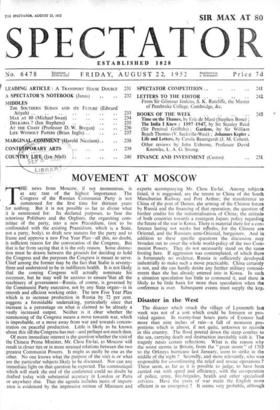Disaster in the West
The disaster which struck the village of Lynmouth last week was not of a sort. which could be foreseen or pro. vided against. In twenty-four hours parts of Exmoor had more than nine inches of rain—a fall of monsoon pro. portions which is almost, if not quite, unknown to records in this country. The flood poured down the steep combes to the sea, carrying death and destruction inevitably with it. The tragedy raises certain reflections. What is the reason why the worst storms in Britain, from the " great storm " of 1703 to the Orkneys hurricane last January, seem to strike in the middle of the night ? Secondly, and more relevantly, who was responsible for co-ordinating the relief and rescue operations ? These seem, as far as it is possible to judge, to have been carried out with speed and efficiency, with the co-operation of police, army, fire-brigades, health and other specialised services. Have the years of war made the English more efficient in an emergency ?. It seems very probable, although Lynmouth was of course fortunate in one respect in that there were several army camps in the neighbourhood. The sympathy of everyone in the country, particularly of those who knew this severe but friendly strip of coast, has been keenly aroused by the plight of Lynmouth, and the various relief funds which have been opened afford a chance, of which the Spectator has already availed itself, of giving sympathy a practical form. But much that is irreplaceable has been destroyed. There is, above all, the loss of life, which is by itself on a scale to make the disaster live in history; then there is the loss of crops and the ruin of good land, (for a wide area of Exmoor and its surroundings has been ravaged) the destruction of old homes and possessions (including the cottage where Shelley spent happy months in the summer of 1812). But Lynmoutb will certainly show the same capacity for revival that the blitzed towns showed in the war.



























